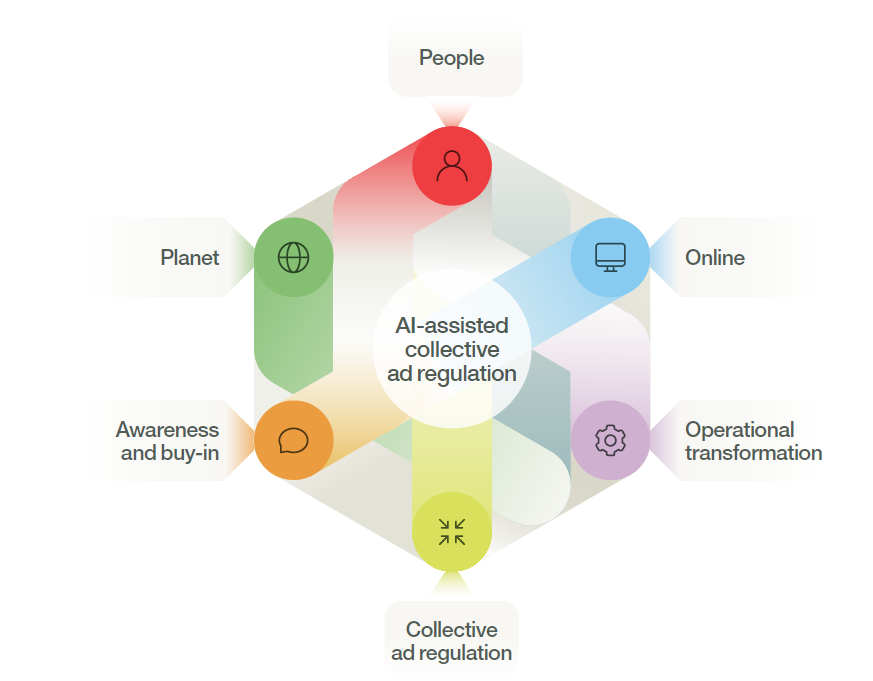
ASA’s 5-Year Strategy: The Road Ahead
The Advertising Standards Authority (ASA) has launched a five-year strategy (2024-2028) focusing on AI-assisted regulation, ad oversight, environmental protection, and ad regulation trajectory. The IPM takes a look at the impact on promotional marketing.
January 03, 2024
In December 2023, the Advertising Standards Authority (ASA) unveiled a comprehensive five-year strategy that sets the stage for AI-assisted regulation, collective ad oversight, environmental protection, and the trajectory of ad regulation in the years to come. This six-strand approach promises to strongly influence agencies and brands engaged in promotional marketing activities. Join us as we delve deeper into the ASA’s strategic pillars and their implications for the world of promotional marketing.
People-Centric Approach
The ASA recognises both the benefits and potential negative impacts of ads on society. While there is widespread acknowledgment of the positive aspects of ads, such as their entertainment value and social contributions, the public’s perception is often clouded by scepticism. This is mainly driven by concerns related to ad saturation, data privacy, and apprehension about how ads may affect vulnerable groups. The regulator’s commitment to protecting these groups means that promotions targeting such individuals will be closely monitored. For this reason, brands and agencies must ensure that their promotions are not designed to exploit vulnerable consumers such as children, or other susceptible groups. The ASA notes the challenge in handling subjective aspects of advertising, like offence, and plans to focus on the most serious cases, acknowledging the impossibility of pleasing everyone in a divided society:
“With growing divisions in society, we will not be able to please everyone, for example on matters of harm and offence. We will review the thresholds for intervening against ads on grounds of offence, prioritising the most serious cases”.
Planet and Environmental Commitment
The ASA’s climate strategy aligns with the UK, Welsh, and Northern Irish Governments’ commitment to net zero by 2050, with a 78% reduction by 2035, and the Scottish Government’s target for 2045. They acknowledge the pivotal role advertising plays in addressing the climate crisis and view advertising as part of the solution rather than a problem. Yet as part of the ASA’s focus on the environment, marketers running promotional marketing campaigns related to eco-friendly products or sustainability will face greater scrutiny. The ASA’s Climate Change and Environment project will specifically target promotions with misleading green claims. Marketers must ensure that their promotional materials accurately represent their environmental commitments and product claims to avoid regulatory action. This is especially important in sectors critical to environmental goals, such as housing and transport. Additionally, the ASA has set ambitious objectives for its own Net Zero plan, striving to achieve net zero emissions by 2030 at the latest.
Online Advertising Regulation
The ASA recognises that people are spending increasing amounts of time online, and businesses are dedicating more resources to online advertising than ever before. While businesses bear primary responsibility for the content of their ads, there is a growing expectation within UK society that the all parties involved in the online advertising supply chain should play a more substantial role in upholding the rules. With rapid technological advancements, such as connected TVs and generative artificial intelligence, the ASA is challenged to regulate a complex and changing landscape. Yet despite this challenge, they expect to process over three million ads through their Active Ad Monitoring system, enhancing compliance reporting, and addressing irresponsible online ads more effectively.
“We will not necessarily wait for complaints to be made against a brand before taking action”
Guy Parker, the CEO of the Advertising Standards Authority (ASA).
Awareness and Industry Collaboration
The ASA is also looking to deepen its relationship with major online platforms such as Google, Instagram, Amazon, and Facebook to ensure their regulations apply across those advertising platforms. The emphasis on a collective approach may lead to closer cooperation between organisations in addressing issues related to promotions, particularly in areas like Less Healthy Food promotions, where major legislation is set to be enacted. To help solve cross-border issues, the ASA will engage with supranational organisations, through membership of the European Advertising Standards Alliance (EASA) and International Council for Advertising Self-Regulation (ICAS).
Operational Transformation
The ASA’s operational transformation strategy is leveraging AI and data science to hit the three million ad target, alongside addressing the complex and growing nature of online advertising. The AI-assisted monitoring will likely result in quicker identification and removal of misleading or irresponsible online promotions however it raises questions about the ability of algorithms to contextually understand and accurately regulate nuanced advertising content. To this point, Guy Parker comments:
“You don’t press a button for the machine to tell you whether the arguments and evidence are good enough. Judgement still must come into it. We need to be proactive in making sure we’re setting the rules in the right place in these sorts of areas”.
Guy Parker, the CEO of the Advertising Standards Authority (ASA)
The ASA’s 2024-2028 strategy will undoubtedly shape the landscape of promotional marketing activities in the UK. Brands and agencies must align their practices with the ASA’s evolving regulations, emphasising responsibility, transparency, and adherence to environmental commitments. Nevertheless, unanswered questions linger, particularly regarding the practical implementation of the ASA’s strategy, its implications for cross-border advertising and whether their stated targets are achievable. As technology continues to advance, the advertising industry must remain adaptable and responsive to changing ASA standards, with a shared goal of ensuring responsible and ethical promotional practices.
News
Pringles × Super Mario: The Boss Level Brand Partnership That Won the IPM Grand Prix
Brand Culture, last year’s IPM Grand Prix winners, reveal how Pringles × Super Mario turned a brand partnership into shelf-side excitement, from the Mystery Flavour “question block” idea to collectable character cans.
HFSS Advertising Regulations: What Marketers Need to Know
HFSS regulations have entered a new phase. This article breaks down what the latest rules mean for marketers, where the key risks sit, and how IPM tools and legal support can help.
Promotions Wrapped! Playing Back the Biggest Trends of 2025
From Superman on The Shard to ‘AI slop’, see what cut through in 2025...
3rd January 2023
In December 2023, the Advertising Standards Authority (ASA) unveiled a comprehensive five-year strategy that sets the stage for AI-assisted regulation, collective ad oversight, environmental protection, and the trajectory of ad regulation in the years to come. This six-strand approach promises to strongly influence agencies and brands engaged in promotional marketing activities. Join us as we delve deeper into the ASA’s strategic pillars and their implications for the world of promotional marketing.
People-Centric Approach
The ASA recognises both the benefits and potential negative impacts of ads on society. While there is widespread acknowledgment of the positive aspects of ads, such as their entertainment value and social contributions, the public’s perception is often clouded by scepticism. This is mainly driven by concerns related to ad saturation, data privacy, and apprehension about how ads may affect vulnerable groups. The regulator’s commitment to protecting these groups means that promotions targeting such individuals will be closely monitored. For this reason, brands and agencies must ensure that their promotions are not designed to exploit vulnerable consumers such as children, or other susceptible groups. The ASA notes the challenge in handling subjective aspects of advertising, like offence, and plans to focus on the most serious cases, acknowledging the impossibility of pleasing everyone in a divided society:
“With growing divisions in society, we will not be able to please everyone, for example on matters of harm and offence. We will review the thresholds for intervening against ads on grounds of offence, prioritising the most serious cases”.
Planet and Environmental Commitment
The ASA’s climate strategy aligns with the UK, Welsh, and Northern Irish Governments’ commitment to net zero by 2050, with a 78% reduction by 2035, and the Scottish Government’s target for 2045. They acknowledge the pivotal role advertising plays in addressing the climate crisis and view advertising as part of the solution rather than a problem. Yet as part of the ASA’s focus on the environment, marketers running promotional marketing campaigns related to eco-friendly products or sustainability will face greater scrutiny. The ASA’s Climate Change and Environment project will specifically target promotions with misleading green claims. Marketers must ensure that their promotional materials accurately represent their environmental commitments and product claims to avoid regulatory action. This is especially important in sectors critical to environmental goals, such as housing and transport. Additionally, the ASA has set ambitious objectives for its own Net Zero plan, striving to achieve net zero emissions by 2030 at the latest.
Online Advertising Regulation
The ASA recognises that people are spending increasing amounts of time online, and businesses are dedicating more resources to online advertising than ever before. While businesses bear primary responsibility for the content of their ads, there is a growing expectation within UK society that the all parties involved in the online advertising supply chain should play a more substantial role in upholding the rules. With rapid technological advancements, such as connected TVs and generative artificial intelligence, the ASA is challenged to regulate a complex and changing landscape. Yet despite this challenge, they expect to process over three million ads through their Active Ad Monitoring system, enhancing compliance reporting, and addressing irresponsible online ads more effectively.
“We will not necessarily wait for complaints to be made against a brand before taking action”
Guy Parker, the CEO of the Advertising Standards Authority (ASA).
Awareness and Industry Collaboration
The ASA is also looking to deepen its relationship with major online platforms such as Google, Instagram, Amazon, and Facebook to ensure their regulations apply across those advertising platforms. The emphasis on a collective approach may lead to closer cooperation between organisations in addressing issues related to promotions, particularly in areas like Less Healthy Food promotions, where major legislation is set to be enacted. To help solve cross-border issues, the ASA will engage with supranational organisations, through membership of the European Advertising Standards Alliance (EASA) and International Council for Advertising Self-Regulation (ICAS).
Operational Transformation
The ASA’s operational transformation strategy is leveraging AI and data science to hit the three million ad target, alongside addressing the complex and growing nature of online advertising. The AI-assisted monitoring will likely result in quicker identification and removal of misleading or irresponsible online promotions however it raises questions about the ability of algorithms to contextually understand and accurately regulate nuanced advertising content. To this point, Guy Parker comments:
“You don’t press a button for the machine to tell you whether the arguments and evidence are good enough. Judgement still must come into it. We need to be proactive in making sure we’re setting the rules in the right place in these sorts of areas”.
Guy Parker, the CEO of the Advertising Standards Authority (ASA)
The ASA’s 2024-2028 strategy will undoubtedly shape the landscape of promotional marketing activities in the UK. Brands and agencies must align their practices with the ASA’s evolving regulations, emphasising responsibility, transparency, and adherence to environmental commitments. Nevertheless, unanswered questions linger, particularly regarding the practical implementation of the ASA’s strategy, its implications for cross-border advertising and whether their stated targets are achievable. As technology continues to advance, the advertising industry must remain adaptable and responsive to changing ASA standards, with a shared goal of ensuring responsible and ethical promotional practices.
News
Pringles × Super Mario: The Boss Level Brand Partnership That Won the IPM Grand Prix
Brand Culture, last year’s IPM Grand Prix winners, reveal how Pringles × Super Mario turned a brand partnership into shelf-side excitement, from the Mystery Flavour “question block” idea to collectable character cans.
HFSS Advertising Regulations: What Marketers Need to Know
HFSS regulations have entered a new phase. This article breaks down what the latest rules mean for marketers, where the key risks sit, and how IPM tools and legal support can help.
Promotions Wrapped! Playing Back the Biggest Trends of 2025
From Superman on The Shard to ‘AI slop’, see what cut through in 2025...







